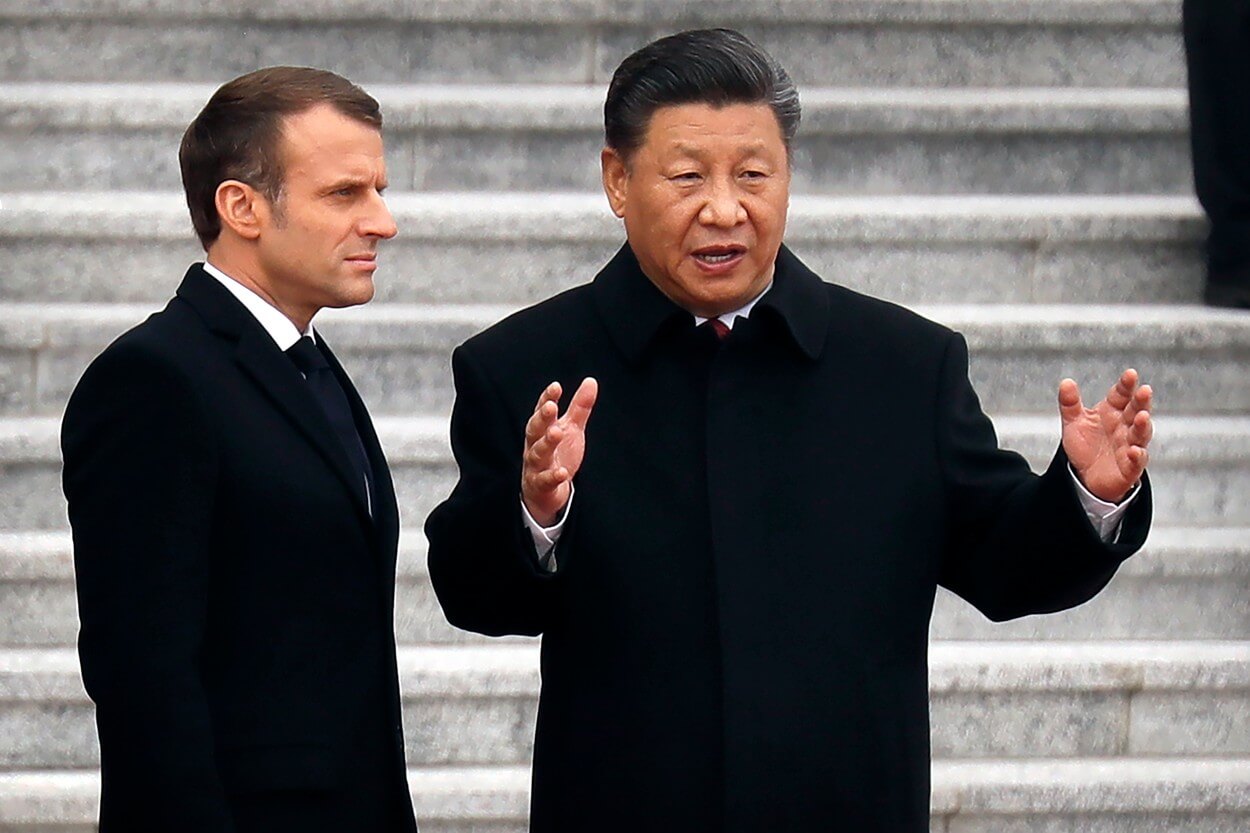Following his conversation with Chinese President Xi Jinping on Tuesday, French President Emmanuel Macron stressed on their points of convergence on the Ukraine war, saying that they both agree on the need for a ceasefire and “respect for Ukraine’s territorial integrity and sovereignty.” This is in sharp contrast to other Western nations, like the United States, which have pressed China to outright condemn Russia and warned of sanctions if it refuses to do so.
In a tweet, Macron said discussed the possibility of a global food crisis due to the Ukraine war, which he said has underscored the utility of France’s Food and Agriculture Resilience Mission (FARM). Referring to any differences the two countries might have, the French leader noted Xi’s shared desire to “continue deepening and rebalancing the partnership between our countries.”
⚡️China's Xi agrees with Macron on urgency of ceasefire in Ukraine.
— The Kyiv Independent (@KyivIndependent) May 10, 2022
Chinese leader Xi Jinping “agreed on the urgency of a ceasefire” in Ukraine during a call with his French counterpart Emmanuel Macron, the Élysée Palace said in a statement.
Similarly, a press release by China’s foreign ministry highlighted that the two leaders shared “many common understandings” on Ukraine. In fact, Xi appreciated Macron’s desire to ensure France’s “strategic independence.” However, it made no reference to Ukraine’s sovereignty.
Xi said that parties must help Russia and Ukraine restore peace and highlighted China’s role in promoting peace talks “in its own way.” Xi further warned against a bloc-wide confrontation, posing a more significant threat to global security and stability. In this regard, Macron assured Xi that neither France nor the EU would promote a bloc-wide confrontation.
With President Xi Jinping, I discussed the tragic situation faced by the Ukrainian people because of the Russian aggression. We share the goals of a ceasefire and of respect for Ukraine’s territorial integrity and sovereignty. pic.twitter.com/rOFdbyVB3F
— Emmanuel Macron (@EmmanuelMacron) May 10, 2022
China has refused to condemn the Russian invasion and abstained from voting or rejected resolutions against its ally in the United Nations Security Council and General Assembly. China has deemed Russia’s security concerns as “legitimate,” saying the West should address these concerns. It has repeatedly referred to Russia as its “most important strategic partner” and spoken out against the North Atlantic Treaty Organization’s eastward expansion. There are also Western intelligence reports that suggest that Chinese officials had prior knowledge of Russia’s plans and asked it to delay its invasion of Ukraine until after the completion of the Beijing Winter Olympics.
France, meanwhile, has sought to avoid endangering ties with China and being seen as an unquestioning US ally. For instance, in February, Macron refused to join the US-led diplomatic boycott of the Beijing Winter Olympics, calling it “insignificant.” The US, the United Kingdom, Australia, Canada, Lithuania, Denmark, Belgium, and a number of other Western countries and allies refused to send diplomatic representatives to the Games over China’s poor human rights record and attempts to change status quo in the Indo-Pacific.
President Xi spoke with French President Emmanuel Macron on the phone. They gave high appraisal of the fruitful cooperation in the past 5 years and agreed to further the healthy growth of China-France relations in the coming 5 years.
— Hua Chunying 华春莹 (@SpokespersonCHN) May 10, 2022
Macron and Xi also discussed deepening bilateral cooperation in aviation and civil nuclear power. According to a press release by Elysée Palace, Macron discussed China’s COVID-19 situation and urged Chinese officials to address the concerns of the French community, referring to reports that children are being separated from their parents if they test positive for the virus. Macron also urged his Chinese counterpart to lift sanctions imposed on Lithuania, imposed last December after the Baltic nation expanded diplomatic ties with Taiwan, and implement International Labour Organization's (ILO) conventions against forced labour, particularly in Xinjiang.
Likewise, the statement by the Chinese foreign ministry noted close contact between both countries and stated that both countries should commit to upload “independence, mutual understanding, strategic vision and win-win cooperation.” “China will keep up close exchanges with France at all levels to promote the healthy growth of China-France relations and to maintain world peace and stability,” stated the press release.
Macron: Xi said he respects Ukraine’s sovereignty and calls for a ceasefire.
— Stuart Lau (@StuartKLau) May 11, 2022
Chinese readout: huh? pic.twitter.com/JCllZG1GxD
In addition, Xi urged his French counterpart to expand cooperation in developing sectors such as artificial intelligence and clean energy, while bolstering cooperation in traditional domains such as civilian nuclear energy, aviation, and aerospace. The press release also noted the bilateral trade relationship, with the Chinese president urging France to give Chinese investors “a fair, equitable and non-discriminatory business environment.”
“The two sides should follow true multilateralism, uphold the international system with the UN at its core and the international order based on international law, support multipolarity and economic globalization, and deepen cooperation on climate change and biodiversity,” stated the press release.
According to the Chinese account, Macron said that on Ukraine, France "has a lot of consensus with the Chinese side."
— Finbarr Bermingham (@fbermingham) May 10, 2022
China says Macron told Xi that "France and the EU adhere to the strategy of independence and autonomy, and neither agree nor participate in bloc confrontation"
Furthermore, Xi discussed increasing communication, cultural exchanges, coordination on global food and energy security, and trilateral cooperation in Africa and other regions.
They also touched on expanding collaboration in trade, green energy, digital development, and people-to-people exchanges between China and the European Union as a whole.

